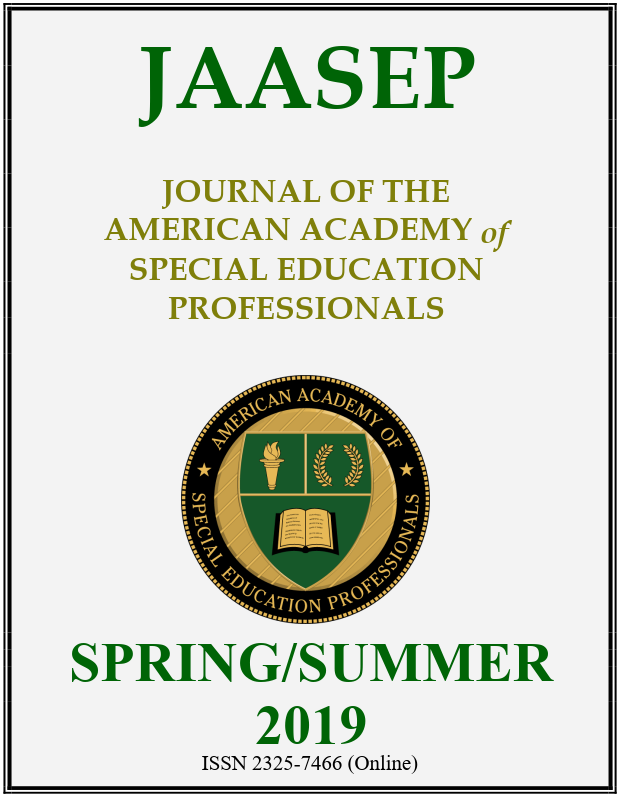Addressing the Need for Progress in Special Education: Understanding Endrew F. and the Role of Special Educators
Algozzine, K., & Algozzine, B. (2007). Classroom instructional ecology and school-wide positive behavior support. Journal of Applied School Psychology, 24, 29-47. doi 10.1300/J370v24n01_02 DOI: https://doi.org/10.1300/J370v24n01_02
Board of Education of Hendrick Hudson Central School District v. Rowley (Rowley), 458 U.S. 176 (1982).
Brown v. Board of Education, 347 U.S. 483 (1954). U. S. Department of Education. (Dec. 7, 2017; U.S. DOE). Questions and Answers (Q&A) on U.S. Supreme Court Case Decision Endrew F. v. Douglas County School District Re-1. Downloaded from https://www2.ed.gov/policy/speced/guid/idea/memosdcltrs/qa-endrewcase-12-07-2017.pdf
Education for all Handicapped Children Act, Pub. L. No. 94-332 (1975).
Endrew F. v. Douglas Country School District (Endrew F.), 580 U.S. (2017). Endrew F. v. Douglas Country School District (Endrew F.), Civ. Action No. 12-cv-2620-LTB (D. Colo. February 12, 2018. Hall v. Vance Country Board of Education, 774 F.2d 629 (4th Cir. 1985).
Hargrove, E. C., Graham, S. G., Ward, L. E., Abernethy, V., Cunningham, J. & Vaughn, W. (1983). Regulation and schools: The implementation of equal education for handicapped children. Peabody Journal of Education, 60, 123-126. doi:10.1080/01619568309538421 Individuals with Disabilities Act, 20 U.S.C. §§ Section 1414 et seq. (2006 & Supp. V. 2011). Katz, M. S. (1976). A History of Compulsory Education Laws. Fastback Series, No. 75. Bicentennial Series.
Koseki, M. H. (2017). Meeting the needs of all students: Amending the IDEA to support special education students from low-income households. Fordham Urban Law Journal, 3, 793. M. C. ex rel. J. C. v. Central Regional Sch. Dist. (J. C.), 81 F.3d 389 (3rd Cir. 1996). Mills v. Board of Education of the District of Columbia, 348 F. Supp. 866 (D.D.C. 1972). Pennsylvania Association for Retarded Children v. the Commonwealth of Pennsylvania, 343 F. Supp. 279 (E.D. Pa. 1972).
Spaulding, L. S., & Pratt, S. M. (2015). Article 7: A review and analysis of the history of special education and disability advocacy in the United States. American Educational History Journal, 42, 91-109.
Sugai, G., & Horner, R. H. (2002). The evolution of discipline practices: School-wide positive behavior supports. Child and Family Behavior Therapy, 24, 23-50. doi :10.1300/J019v24n01_03 DOI: https://doi.org/10.1300/J019v24n01_03
Sugai, G., & Horner, R. H. (2009). Defining and describing schoolwide positive behavior support. In W. Sailor, G. Dunlap, G. Sugai, & R. H. Horner (Eds.), Handbook of positive behavior support (pp. 307-326). New York: Springer. Timothy W. v. Rochester School District, 875 F. 2d 954 (1st Cir. 1989). DOI: https://doi.org/10.1007/978-0-387-09632-2_13
Turnbull, H. Rutherford, Turnbull, A. P., & Cooper, D. H. (2018). The supreme court, Endrew, and the appropriate education of students with disabilities. Exceptional Children, 84, 124-140. doi:10.1177/0014402917734150 DOI: https://doi.org/10.1177/0014402917734150
U. S. Supreme Court. (2016). Cert. Granted 9/29/2016. 15-827 Endrew v. Douglas County School, Dist. Re-1.
U. S. Supreme Court. (2016). Oral Argument Transcript for Endrew F. Downloaded from https://www.supremecourt.gov/oral_arguments/argument_transcripts/2016/15-827_gfbh.pdf
Wright, P. W. D., Wright, P. D. (2011). Special Education Law, 2nd Ed. Hartfield, VA: Harbor House Law Press, Inc.
Yell, M. L., & Bateman, D. F. (2017). Andrew F. v. Douglas County School District (2017) FAPE and the U.S. supreme court. Teaching Exceptional Children, 50, 7-15. doi:10.1177/0040059917721116 DOI: https://doi.org/10.1177/0040059917721116
Yell, M. L., Katsiyannis, A., & Hazelkorn, M. (2007). Reflections on the 25th anniversary of the U.S. supreme court’s decision in Board of Education v. Rowley. Focus on Exceptional Children, 39, 1-12. doi:10.17161/foec.v39i9.6876 DOI: https://doi.org/10.17161/foec.v39i9.6876
Yell, M. L., Rogers, D., & Rogers, E. L. (1998). The legal history of special education: what a long, strange it’s been! Remedial & Special Education, 19, 219-228. doi:10.1177/074193259801900405 DOI: https://doi.org/10.1177/074193259801900405
Zirkel, P. A. (2013). Is it time for elevating the standard for FAPE under IDEA? Exceptional Children, 79, 497-508. doi:10.1177/001440291307900407 DOI: https://doi.org/10.1177/001440291307900407
Downloads
Article Information
- Article Type Articles
- Submitted April 10, 2019
- Published June 15, 2019
- Issue Spring/Summer 2019
- Section Articles
